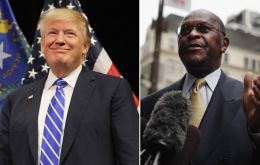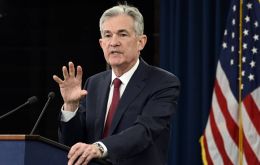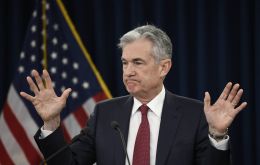MercoPress. South Atlantic News Agency
Tag: Federal Reserve
-
Saturday, April 6th 2019 - 09:43 UTC
Trump again puts pressure on the Federal Reserve to lower interest rates

United States president Donald Trump said on Friday the US Federal Reserve should lower interest rates and take other unconventional measures to ease pressure on an economy that he said they slowed down. “I think they should drop rates,” Trump told reporters. “I think they really slowed us down. There's no inflation.”
-
Friday, April 5th 2019 - 08:52 UTC
Ex Republican presidential hopeful, Trump’s candidate for the Fed

United States President Donald Trump has confirmed he recommended former Republican presidential hopeful Herman Cain for a seat on the Federal Reserve Board. Mr Trump told reporters at the White House Mr Cain is undergoing background checks to join America's central bank.
-
Thursday, March 21st 2019 - 09:40 UTC
Fed confirms it does not expect to raise interest rates in 2019

The US Federal Reserve does not expect to raise interest rates for the rest of 2019 amid slower economic growth. After a two-day meeting, monetary policymakers voted unanimously to keep the US interest rate range between 2.25%-2.5%.
-
Thursday, February 21st 2019 - 09:05 UTC
Fed changes focus from interest rates to balancing reduction of the US$ 4 trillion it holds in assets

The United States Federal Reserve on Wednesday signalled they will soon lay out a plan to stop letting go of US$4 trillion in bonds and other assets, but policymakers are still debating how long their newly adopted “patient” stance on U.S. rates policy will last.
-
Sunday, February 3rd 2019 - 10:36 UTC
Latin American markets reacted positively to Fed' message of “wait and see”

Most Latin American stocks rose on Friday after U.S. economic data pointed to the possibility that the Federal Reserve could keep interest rates unchanged. Shares extended their rally after U.S. employment and manufacturing data underscored a strong economy with little wage inflation.
-
Thursday, January 31st 2019 - 09:15 UTC
Federal Reserve adopts “wait and see” policy. Economy facing contradictory picture of crosscurrents, says Powell

The Federal Reserve on Wednesday signaled its three-year-drive to tighten monetary policy may be at an end amid a suddenly cloudy outlook for the U.S. economy due to global headwinds and impasses over trade and government budget negotiations.
-
Saturday, January 5th 2019 - 08:40 UTC
Fed brings relief to markets saying it would be “patient” about rate hikes

Federal Reserve Chair Jerome “Jay” Powell took steps to reassure financial markets on Friday, saying that the US central bank would be “patient” about rate rises. He also defended his independence, saying he would not resign if requested by US President Donald Trump.
-
Thursday, December 20th 2018 - 08:59 UTC
Fed raises interest rate but lowers 2019 forecast to two hikes in 2019

The United States Federal Reserve raised its key interest rate on Wednesday for a fourth time this year but lowered its forecast to two hikes in 2019 amid the recent stock market sell-off and uncertain growth prospects.
-
Thursday, December 13th 2018 - 08:49 UTC
US consumer prices in November unchanged, with sharp decline for gasoline

The United States consumer prices were unchanged in November, held back by a sharp decline in the price of gasoline, but underlying inflation pressures remained firm amid rising rents and healthcare costs. The strength in underlying inflation reported by the Labor Department on Wednesday supports views that the Federal Reserve will raise interest rates at its Dec. 18-19 policy meeting. The U.S. central bank has hiked rates three times this year.
-
Friday, November 9th 2018 - 08:45 UTC
Federal Reserve leaves rate unchanged but December hike is expected

The Federal Reserve has left its key policy rate unchanged but signaled that it plans to keep responding to the strong U.S. economy with more interest rate hikes. The next rate increase is expected in December.
